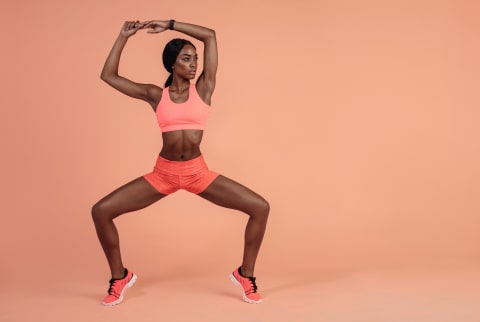Advertisement
A Crash Course In The Ultimate Metabolism-Boosting Workout For Less Stress & More Energy


No time to hit the gym for an endless workout? No problem! In fact, it can be more when it comes to cardio.
The most effective way to get lean and fit is a metabolic conditioning1 workout like burst training. Read on to find out more about why you never have to spend long hours on the treadmill again.
What is burst training?
Burst training, also known as high-intensity interval training (HIIT), is an amazingly effective way to condition your body to burn fat. Burst training alternates short bursts of all-out, high-intensity movement with active recovery that’s twice as long.
For instance, a sample interval might be running up flights of stairs for 30 seconds, then walking back down the stairs for one minute. Or you could swim laps as quickly as possible for one minute, then swim more slowly for two minutes. The options are endless!
With burst training, the focus is on multiple quick bursts of maximum exertion, instead of hours of steady-state cardio like jogging or the elliptical. It’s an effective way to fit in a workout without a huge time investment, and you can use any favorite activity to get your heart pumping.
How is burst training different from classic cardio?
Burst training is a form of cardio that lasts only 8 to 12 minutes total while classic endurance cardio is all about maintaining less-intense exercise for long periods of time. To understand why burst training is a more effective way to condition your metabolism, let’s step back in time a few thousand years...
Imagine you set out on a walk to find food—a long, long walk. The nearest source of nourishment is dozens, even hundreds of miles away. Your body instinctively realizes you need to conserve resources, and it gradually raises stress hormones like cortisol to compensate for the journey to come.
That means you increase fat storage, especially around your middle, and burn precious muscle instead. You won’t need that muscle because it’s all about surviving the lengthy trip ahead. The results of continually elevated cortisol levels2 also mean your immune system is weaker and you feel hungrier. However, your body is willing to make that sacrifice to sustain you until you reach food.
Here’s the problem: Chances are, your long jogs aren’t to obtain precious survival resources. Instead, you’re most likely spending an hour on the treadmill a few times a week in an attempt to get healthier!
Unfortunately, your body doesn’t know the difference, and the results are the same: an inability to lose weight, especially belly fat; less muscle; a higher likelihood you’ll pick up the next bug that’s going around; and an ever-increasing appetite.
Think back in time and imagine you’re doing an entirely different type of hunting. Rather than many long journeys, you’re chasing prey (or being chased!) for survival. That means you need strong, lean muscle and the stamina to run as quickly as you can for short intervals. Ideally, you’ll be carrying as little excess weight as possible.
Your body responds1 to the need for those brief, random bursts of intense activity by increasing the rate at which you burn fat. It also preserves your muscle mass since you clearly need it! And your system learns to handle occasional stress without spiking your cortisol. When you burst train, those are exactly the conditions you mimic—and you reap all the benefits that come with it: lean muscle; better fat-burning potential; and less of the oxidative stress that can cause cellular inflammation and aging.
And all of that comes from just minutes of exercise a few times a week!
Who is burst training for?
The beauty of burst training is that it meets you where you are. This type of metabolic conditioning can work for anyone, from an exercise novice to a seasoned athlete. And there are endless ways to modify burst training for different circumstances.
If you’re already in great shape, then your bursting intervals might involve sprinting uphill or as many burpees as you can manage in 45 seconds. However, if you haven’t exercised in years and just standing up and sitting down takes effort, that will work for bursting, too.
Anything that challenges you can be effective for metabolic conditioning. It works as long as your physical activity allows you to go to the point of exhaustion by the end of each interval.
Burst training is a great choice for endurance athletes who want to build more muscle3. But it’s also ideal for those who:
- Feel self-conscious about going to the gym
- Don’t like working out
- Don’t have a lot of time to exercise
- Need variety to stick with their fitness plan
- Want to manage stress better

Three biggest benefits of metabolic conditioning workouts.
You get maximum results in the shortest amount of time. Less is truly more with high-intensity interval training. In fact, if you can manage more than 12 minutes start to finish, you didn’t push hard enough! Even the busiest person can find the time to do a complete burst training workout.
You can burst train anywhere. No special equipment is required to get a good workout. Mix it up by skipping rope in the backyard, running up and down hotel stairways when traveling, or doing quick sets of jumping jacks on your lunch hour. If it gets easy, add resistance or an incline to the mix.
You’ll never get bored. The possibilities for burst training are literally endless. You can bike or run, get on the elliptical or StairMaster, work out in the pool, do Turkish get-ups—anything that gets you sweating and your heart rate up!
How to burst train:
You can create your own burst training session in four simple steps:
- Choose a fun activity that gets your heart rate up. You should never dread working out, so pick something you look forward to!
- Work as hard as you can at your own pace. Burst training should get you hot and sweaty, and every interval should push your limits physically.
- Alternate bursts with active recovery that’s twice as long. Bursts should be between 20 and 60 seconds, and recovery should be twice as long (40 to 120 seconds).
- Do four bursts and four active recoveries, and you’re done. Yep, that’s it! That means you’re done for the day in 12 minutes or less.
You need to do this type of metabolic conditioning workout only two or three times a week. Because burst training takes your body to the point of exhaustion, it’s crucial to rest and recover between each burst training session.
That’s why you should burst train every other day at most and make the most of recovery days with restorative yoga, a massage, or meditation. If you skip this step, you can cause injury or actually slow down your progress.
To complement the benefits of burst training, try adding resistance training two to three days a week to build up strength and muscle.
A sample 10-minute metabolic conditioning workout.
Here's a basic workout to get you started right away:
Warm up for 2 minutes to get the blood flowing through your muscles and ready for burst training. Pick any activity that matches your fitness level. This could be jogging or marching in place, for example.
Then, get started with the following bursting intervals:
- Sprint at maximum exertion for 30 seconds.
- Walk quickly for 60 seconds.
- Sprint up a flight of stairs for 30 seconds.
- Walk down the stairs for 60 seconds.
- Sprint again for 30 seconds.
- Walk quickly again for 60 seconds.
- Race up the stairs for 30 seconds.
- Walk down the stairs for 60 seconds.
Finally, cool down for 2 minutes with slower activity to steadily bring your heart rate back to normal. And there you have it: Everything you need to start burst training, so give it a try and experience the amazing results for yourself!

JJ Virgin, CNS, BCHN, is a celebrity nutrition and fitness expert who helps clients lose weight fast by breaking free from food intolerance. A certified nutrition specialist, board certified Holistic Nutritionist, and Certified Exercise Physiologist, she is the author of the New York Times best-sellers The Virgin Diet: Drop 7 Foods, Lose 7 Pounds, Just 7 Days and The Virgin Diet Cookbook: 150 Easy and Delicious Recipes to Lose Weight and Feel Better Fast.
More from the author:
Functional Nutrition Training
Check out Functional Nutrition Coaching
A cutting-edge nutrition deep dive taught by 20+ top health & wellness experts
Learn moreMore from the author:
Functional Nutrition Training
Check out Functional Nutrition Coaching
A cutting-edge nutrition deep dive taught by 20+ top health & wellness experts
Learn more
JJ Virgin, CNS, BCHN, is a celebrity nutrition and fitness expert who helps clients lose weight fast by breaking free from food intolerance. A certified nutrition specialist, board certified Holistic Nutritionist, and Certified Exercise Physiologist, she is the author of the New York Times best-sellers The Virgin Diet: Drop 7 Foods, Lose 7 Pounds, Just 7 Days and The Virgin Diet Cookbook: 150 Easy and Delicious Recipes to Lose Weight and Feel Better Fast.